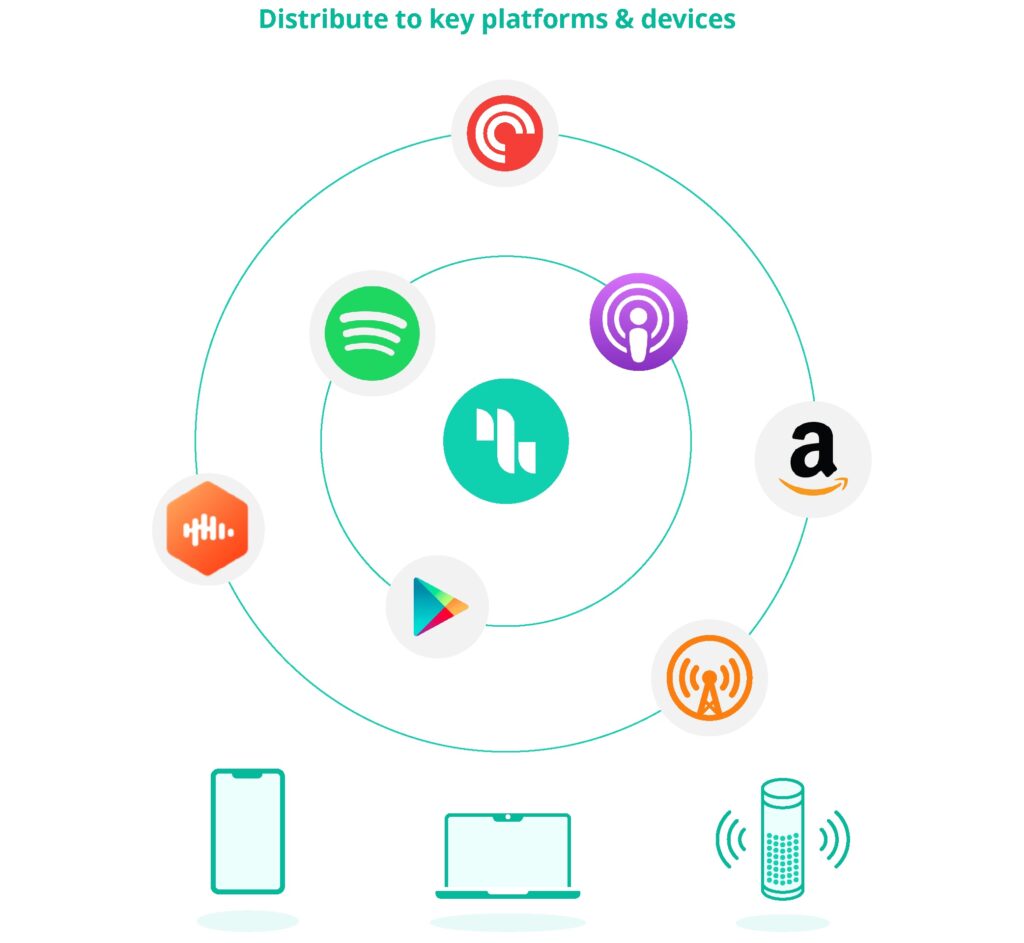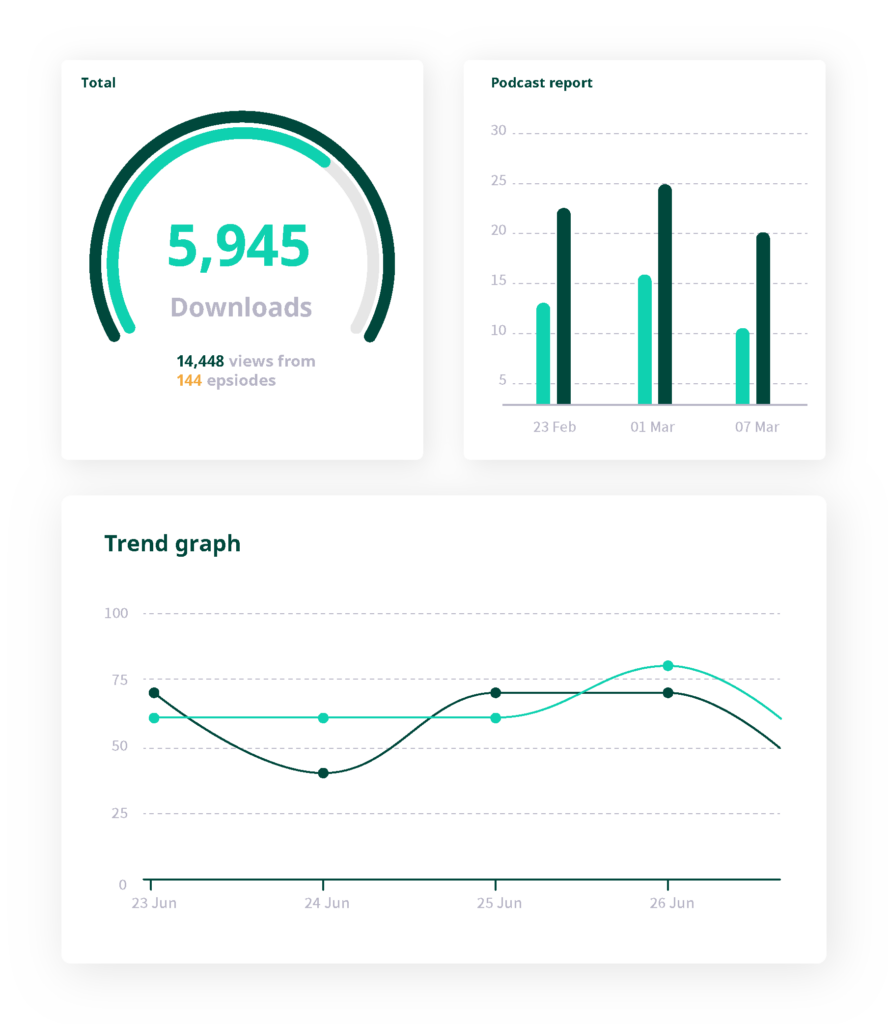October 4, 2022
Blog
How to create a company podcast
Key topics:
This will cover the following vital areas in creating a successful podcast:
- Business Objectives
- Role target audience
- Content and theme of the podcast
- Role of technology
- Distribution and promotion of the podcast
- Analysis and podcast maintenance
Establish the company podcast’s business objective
When you’re setting up a company podcast, your business objective should be front and center. What are you hoping to achieve with this podcast? Perhaps you want to build brand awareness, generate leads, or cultivate customer loyalty. Whatever the goal, it’s important to keep it in mind when planning your podcast content and strategy.
A personal podcast, on the other hand, doesn’t necessarily have to have a business objective. You can simply create content that you enjoy and that you think your audience will find engaging. Of course, even a personal podcast can be monetized if you so choose, but it’s not necessary. The bottom line is that a company podcast should have a clear business objective, while a personal podcast can be more relaxed in terms of its overall purpose.
Establish the role of your company podcast
One of the most important aspects of launching a successful podcast is to establish the role that it will play within your overall marketing strategy. Will the focus be on influencing customers, educating them about your products or services, or promoting specific items?
Once you have a clear understanding of the role that your podcast will play, you can then begin to develop goals and measure success. For example, if your goal is to increase awareness of your brand, you might track the number of downloads and new subscribers. If your goal is to drive sales, you might track conversion rates or the amount of revenue generated from each episode. By clearly defining the role of your podcast and setting measurable goals, you can ensure that your podcast makes a real impact on your business.

Establish your target audience
When it comes to podcasts, target audiences are crucial. After all, without knowing who you’re trying to appeal to, it’s difficult to produce content that will actually resonate. So who is the target audience for your podcast? And how do they consume podcast content? Here are a few things to consider:
First and foremost, you need to establish who your target audience is. What age group are they in? What are their interests? What demographic do they belong to? Once you have a good understanding of your target audience profile, you can start to produce content that will interest them.
Next, consider how your target audience consumes podcast content. Do they listen on their commute? While working out? While doing chores around the house? Knowing when and where they listen will help you produce content that fits into their daily routine.
Finally, think about what type of content would interest your target audience. Would they prefer interviews with experts in their field? Leverage case studies or user stories? Hear about new research or developments in their industry?
Once you have a good handle on what your target audience is looking for, you can start to produce podcasts that will keep them coming back for more.
Establish the theme of your company podcast
When it comes to podcasting, one of the most important things is to have a strong and consistent theme. This will help to ensure that your podcast is of interest and value to your target audience.
It can be helpful to think of your podcast theme as the through-line that ties all of your episodes together. It should be something that is clear and concise, and that you can always come back to. Depending on your goals, your podcast theme could be focused on education, or on a specific industry or market. Whatever you choose, make sure it is something that you are passionate about and that you can commit to over the long run.
Organic Vs Technology driven podcast creation
Starting a podcast can be a daunting task. There are so many questions to answer, from what platform to host your podcast on to what equipment you need to get started. One of the most important decisions you’ll make is whether to create your podcast organically or use technology to automate the process.
Organically creating your podcast involves recording and editing your episodes yourself, without any outside help. This can be a more time-consuming and challenging process, but it also gives you complete control over your show. You’ll be able to decide exactly what goes into each episode and how it sounds.
Automating your podcast creation involves using technology, such as recording and editing software, to help you create and manage your show. This can make the process of starting a podcast much easier, as you won’t have to do everything yourself.
For instance AudioHarvest platform seamlessly integrates smart Voice AI technology with a real-time end to end audio creation and distribution platform, that enables businesses to communicate with their customers wherever and whenever they consume audio. To find out more about how this creates an always on company podcast go here
However, it also means that you’ll have less control over your show and how it sounds.
There’s no right or wrong answer when it comes to organic vs automated podcast creation. It ultimately comes down to what you’re looking for in a podcast and how much time and effort you’re willing to put into it. If you’re just starting out and want an easy way to get your podcast up and running, then automation may be the best option for you. But if you’re looking for complete creative control over your show, then organic creation is the way to go.
Branding your podcast
A successful podcast branding strategy should reflect the show’s overall concept while also appealing to the target audience. A good place to start is with the podcast logo, which will be used on the website, social media, and promotional materials. The logo should be simple and easy to read, with clean lines and a bold color scheme.
Next, focus on creating an engaging description of the podcast that accurately reflects its content. This description will be used on iTunes and other popular podcast directories, so make sure to include keyword phrases that potential listeners are likely to search for.
Finally, create a professional-looking website for the podcast that includes show notes, bios of the hosts, and links to subscribe. By taking the time to brand your podcast using these key elements, you’ll be well on your way to attracting new listeners and growing your audience.
Distributing your podcast via hosting platforms
So, you’ve created a podcast. Congratulations! Now it’s time to get it out there and start building an audience. One of the best ways to do this is to distribute your podcast via a podcast hosting platform.
Podcast hosting platforms are websites that allow podcast creators to submit their podcast episodes and RSS feed. Once your podcast is accepted onto the platform, it will be made available to the platform’s listeners. This can be a great way to reach new listeners and grow your audience.
There are many different podcast hosting platforms to choose from, so it’s important to do some research and decide which one is right for you. Some factors you may want to consider include the size of the platform’s listener base, whether the platform offers any promotional opportunities, and what kind of support they offer podcast creators.
Podcast distribution is key to ensuring that your podcast is heard by the largest possible audience. And when it comes to podcast distribution, there are two clear leaders: Spotify and iTunes. Between them, these two platforms account for the vast majority of podcast listens. That’s why it’s so important to make sure that your podcast is available on both Spotify and iTunes.
But podcast distribution doesn’t end there. Google Podcasts is also a crucial platform, as it ensures that your podcast will be found in Google search results. So if you want your podcast to reach the widest possible audience, be sure to distribute it across all three of these platforms.

Promoting your company podcast
Podcasts are a great way to connect with potential customers and promote your company. There are many ways to promote your podcast, but social media is a great place to start. Sharing your podcast on social media platforms such as Twitter, LinkedIn, and Facebook can help you reach a wider audience.
Additionally, you can use social media to engage with listeners and encourage them to share your podcast with their friends and followers. If you’re looking for more creative ways to promote your podcast, consider guest blogging or conducting interviews with other thought leaders in your industry. By promoting your podcast on social media, you can reach a larger audience and build deeper relationships with your listeners.
Email newsletters are a great way to promote a podcast. By adding a link to your podcast in your newsletter, you can make it easy for subscribers to listen to your latest episode. You can also include a brief description of the podcast, as well as a link to your website or blog.
If you have multiple episodes of your podcast available, you can include links to all of them in your newsletter. This will give subscribers the chance to catch up on previous episodes that they may have missed. Including a link to your podcast in your email newsletter is a simple and effective way to promote your podcast and attract new listeners.
To find out more about how to promote your company podcast go here
Analysing and assessing the podcast results
A podcast can be a great way to connect with potential customers and promote your company. However, simply creating a podcast is not enough to guarantee success. It is also important to analyse and assess the results of your podcast in order to determine what is working and what could be improved.
There are a number of ways to collect data about your podcast’s performance. For example, you can track how many people download or listen to each episode, as well as how long they listen for. You can also gauge engagement levels by looking at how many people interact with your podcast on social media or leave reviews.
Once you have collected this data, you can start to look for patterns and trends. This will help you to understand what types of episodes are most popular with your audience and what topics generate the most discussion. With this information in hand, you can adjust your podcast strategy accordingly and ensure that future episodes are more likely to engage and convert listeners into customers.

Keeping your company podcast relevant
A podcast is a great way to engage with your audience and keep them coming back for more. But like any other content platform, a podcast requires regular maintenance to keep things interesting. Here are a few ways to ensure your podcast remains fresh and engaging:
– Schedule regular release dates and stick to them. This will give your listeners something to look forward to and help them stay subscribed.
– Plan ahead. Having a clear idea of what each episode will be about will help you stay on track and avoid rambling.
– Mix things up. Don’t be afraid to experiment with new topics, formats, or guests. This will keep your podcast sounding fresh and keep your audience engaged.
– Be responsive. Encourage listener interaction by responding to comments and questions. This will make your podcast feel more personal and help build a connection with your audience.
Conclusion
And that’s a wrap! Creating a podcast for your company can be a great way to connect with customers and build brand awareness.
By following the steps outlined in this article, you can create a professional-sounding podcast that will help your business stand out from the competition. So what are you waiting for? Get started today and see how podcasting can help your business grow!
More from our blog
Blog
Amplifying Engagement:
Blog
What Is Voice Cloning?
Blog
